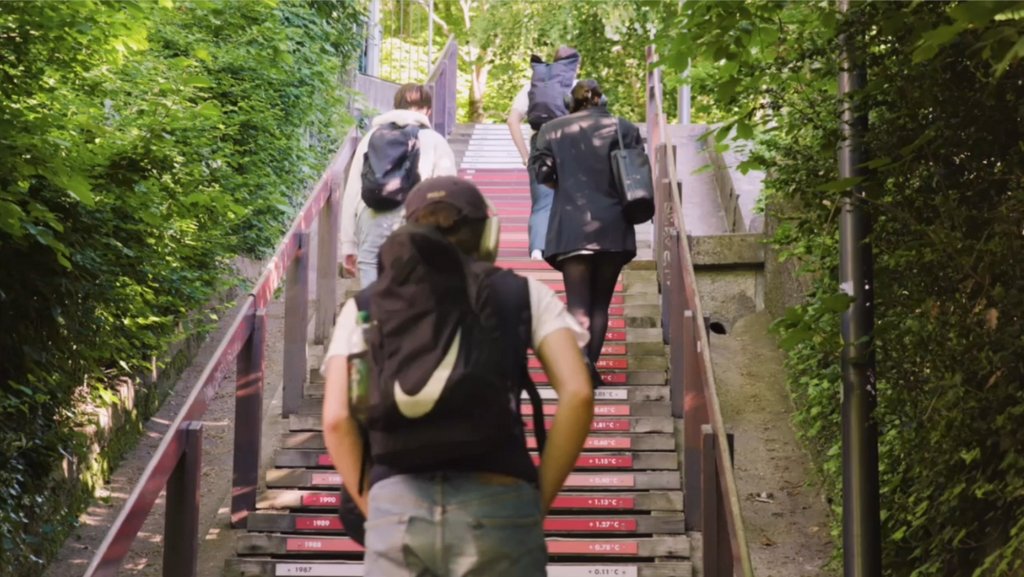Campus - 25.11.2025 - 09:00
The consequences of the climate crisis have long been felt – even in Switzerland. Rising temperatures, melting glaciers, extreme weather. “Scientific guidance is clear on the solutions needed,” says Prof Dr Judith Walls, delegate for Responsibility and Sustainability. “As a business university, we have a vital role to play in translating these insights into corporate action and educating the leaders of tomorrow.” The new HSG sustainability report highlights research and initiatives from the past two years. It focuses on four areas: teaching, research, societal engagement and campus & operations.
The commitment to sustainability is also reflected in the figures for the period from 2023 to 2024:
Sustainability is firmly anchored in the regular curriculum at the University of St.Gallen. One example is the Master's degree programme in International Affairs and Governance (MIA). The specialisation in ’Sustainability & Development is particularly popular.
The HSG's executive education programmes also address this topic: Programmes such as CAS Renewable Energy Management, CAS Sustainable Aviation Management and the seminar Sustainability Performance Management offer participants the opportunity to explore corporate management that focuses on environmental and social issues. In the management modules of the EMBAx with ETH Zurich, for example, business ethics is a core topic.
Sustainability is also a recurring theme throughout all levels of education. The Contextual Studies programme at HSG is multidisciplinary and integrative in nature. It combines cultural and social science course offerings with a clear reference to core subject areas. One flagship project is the Be the Change course series, co-designed by students, which brings them together with start-ups, NGOs and alumni.
Students also show commitment outside the classroom, for example in the Rock Your Life association, which establishes mentoring relationships with young people with a refugee background and promotes equal opportunities. HSG's coaching and mentoring programmes also support students in developing their ideas and growing personally.
Two exciting stories from teaching:
The University of St.Gallen also puts a clear focus on societal impact in its research. How can financial markets be made more sustainable? Prof Dr Julian Kölbel is addressing this question – and has received two awards for his work. For his project “Aggregate Confusion: The Divergence of ESG Ratings”, he received the Pagano and Zechner Prize and the Responsible Business Education Award. Kölbel also hosts the podcast “Innovations in Sustainable Finance” and is involved in the HSG Impact Scholar Community, which connects researchers working on sustainability issues.
Further awards in 2023 and 2024 went to Prof Dr Rolf Wüstenhagen (“Stanford World's Top 2% Scientists”) and Dr Anna Stünzi (“Responsible Business Education Award”, “HSG Impact Award”). Over the two years, a total of around CHF 7.5 million in funding was raised from the Swiss National Science Foundation (SNSF) and HSG's internal Basic Research Fund (GFF) for research projects that address environmental and social challenges in a holistic manner.
Furthermore, the Circular Lab, initiated by HSG researchers Dr Fabian Takacs, Anna Burch, Prof Dr Karolin Frankenberger, Prof Dr Simon Mayer and Prof Dr Andrei Ciortea, is an interdisciplinary flagship project for the circular economy. It was awarded the “HSG Impact Award” in 2025.
Two stories from research:
When research and entrepreneurship come together, the result is impact: Sallea AG, a start-up for plant-based meat and fish substitute products, shows how HSG alumni translate scientific findings into marketable solutions. The company, founded by graduates of HSG and ETH Zurich, is an example of a new generation of responsible founders. Formats such as the HSG Entrepreneurial Champions Programme, the Female Founders Mentoring Programme and the student initiative START Global further strengthen this responsible start-up culture.
There are also strong impulses within the alumni network: Zukunft-Fabrik.2050, an association within the HSG Alumni network, offers practical scientific input, organises digital events and cooperates with initiatives from START Global and the internationally renowned St. Gallen Symposium, which has been fostering a dialogue between decision-makers and students on global responsibility for over fifty years.
The St.Gallen Transformation Lab was established to further promote collaboration between various internal and external stakeholders. The platform enables the joint development of sustainable and innovative visions for the future and delivers concrete contributions to solve the grand challenges of our time.
Two examples of innovation:
The University of St.Gallen campus offers an inspiring environment for learning and working. HSG strives for sustainable operations, including a net-zero campus: heating and ventilation systems have been modernised, solar panels installed and electricity procurement switched entirely to hydropower several years ago. Further, green spaces are maintained according to biodiversity principles, accessibility is standard in new buildings, and the replacement of the remaining gas heating in the main building is planned. The new HSG Platztor "Tsumiki" campus is also intended to be a model for construction projects in the post-fossil fuel era.
Sustainability on campus is not limited to ecological measures. The Centre for Diversity, Equality and Inclusion (DE&I) and initiatives by the student association Universa or PRIDE Month promote equality, inclusion and diversity. From 2025, DEI projects by students and staff will receive additional financial support from the Gender Equality Committee.
Two stories on strengthening sustainability on campus:
Building on previous initiatives in teaching, research, societal engagement and campus operations, HSG is consolidating its efforts in a sustainability strategy for 2024–2028. It sets three overarching goals:
The University of St.Gallen demonstrates that academic excellence and sustainable action go hand in hand. Sustainability is an ongoing process in which activities are constantly adapted and optimised – an approach described by Manuel Ammann, President of the University of St.Gallen, as follows: “As a university, we are committed to a broad understanding of sustainability, which includes responsibility for the environment, society and the economy.”
The full report is available online at:
